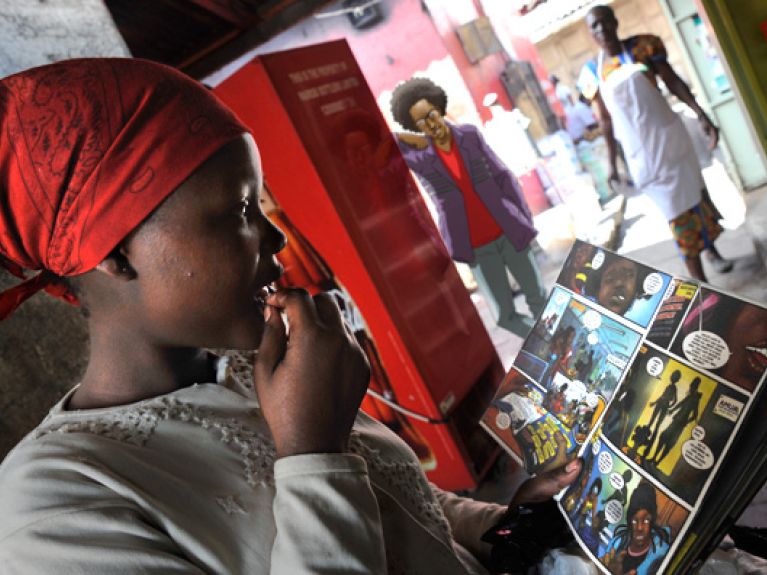Heroes and hard-boiled eggs
Kenyan multimedia platform “Shujaaz” wants to change the way young people behave. It is partly funded by Germany’s Hanns Seidel Foundation.

The business with the hard-boiled eggs was one of the things that most impressed Rob Burnet. But more about that later. The Brit is the founder and director of “Well Told Story” (WTS), a Kenya-based company that produces a variety of media while at the same time pursuing sociological research. Funding for this research comes partly from Germany’s Hanns Seidel Foundation. Based in Karen, close to the capital Nairobi, WTS’ most important product is “Shujaaz” (“Heroes”), which Burnet describes as “a kind of interactive media platform for young people”.
A number of comic figures, of which “DJ B” is the most important, are at the heart of the Shujaaz universe. DJ B, whose real name in the Shujaaz universe is Boyie, is just your average Kenyan “loser”: after dropping out of school, he spends his days trying to drum up a few shillings and a little respect. Yet DJ B has created an escape from his drab everyday existence: his bedroom is home to his own pirate radio studio “Shujaaz.fm”. Boyie broadcasts stories from his daily life, stories which have turned the loser into a hero – not only in the comic, but also in reality.
4.7 million readers
The comic is distributed free of charge by WTS and is also included as a supplement to Kenya’s biggest daily newspaper, the “Daily Nation”. Burnet estimates that each comic reaches 4.7 million readers – a huge number given the country’s population of around 40 million. In addition, there are those who know DJ B from the “Shujaaz” radio programmes made by Burnet’s team of young writers, illustrators and radio producers and aired by several private radio stations in Kenya and Tanzania. Naturally, DJ B and his friends are also active in the social media networks. All their activities are interactive, so readers, listeners and users can always influence the stories. The language of Shujaaz is the youth slang Sheng in Kenya and the local variant of youth Swahili in Tanzania.
As entertaining and popular as the stories may be, they have a very serious objective: “We want to change the way young people behave”, explains Burnet during an interview in the company’s office in Karen. Young men and women are sitting at their laptops at large wooden desks, and the working atmosphere is focused yet friendly. Twelve members of the 40-strong team are engaged exclusively with research. “We want to get a very clear picture of what our readers and listeners are thinking before we introduce a new topic”, says Burnet, explaining that this is the only way to attract attention – which in turn is essential if one is to influence behaviour.
New sources of income for young people
Above all, Shujaaz wants to help young people to be creative and generate sources of income for themselves. Very few can ever hope for a formal job – “up to 90 percent of young people will never land a job with an employment contract”. According to Burnet, 1.2 million young people enter the Kenyan employment market for the first time each year, while the figure in Tanzania is 800,000. Work, the establishment of micro businesses and similar topics are therefore recurrent themes in the Shujaaz world. However, DJ B and his friends also address supposedly taboo subjects such as sex and contraception or interethnic hatred. Many politicians fuel the reciprocal prejudices because they hope to gain votes and financial benefits as a result. Following the 2007 presidential elections, this “policy” escalated and sparked serious riots that left hundreds dead – Kenya only narrowly avoiding a civil war. DJ B and his friends want to do what they can to prevent this scenario from being repeated.
With funding from the Hanns Seidel Foundation, the WTS team has also investigated the current state of and reasons for religious radicalisation among young people in Kenya. Burnet sums up the findings as follows: “For the young people who later become radicalised, it is almost never about religion at first. Instead, they feel rejected by society and by the Kenyan government.” At the end of the day, what they are searching for is respect and recognition, not to mention an income. Radical groups such as the Somali militant terrorist group Al-Shabaab find followers in Kenya because this is precisely what they promise the young people. WTS plans to incorporate the results of these investigations into the stories in the Shujaaz universe just as soon as the necessary financial resources can be found.
Good ideas thanks to Shujaaz
Burnet uses a whole series of statistics to illustrate that they are successful in their work and can bring about changes in behaviour. He also recounts the story of the hard-boiled eggs. WTS learn about it because a young woman wrote to DJ B with great excitement and enthusiasm, explaining that she now earns three times as much as she used to thanks to Shujaaz! The 21-year-old was earning a living by hard-boiling eggs in the morning and then selling them during the day to workers on building sites. Inspired by Shujaaz, she had the idea of serving her eggs with a side order of Kachumbari, a Kenyan version of tomato salad. She now sells three times as many eggs each day and has been able to save a little money, which she has been investing in other micro businesses. The young woman is one of many heroes portrayed by Shujaaz and who serve as examples to each other.
© www.deutschland.de

